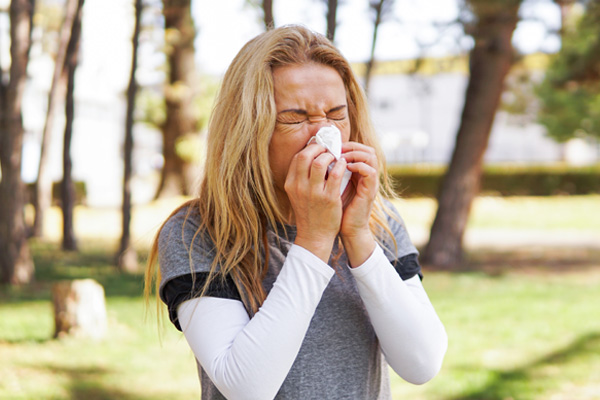Spring is warmer temperatures, glorious sunshine and beautiful flowers in bloom. The sunny season arrives with a lot of good vibes but a lot of hay fever.
Hay fever affects 1 in 5 Australians and common symptoms include an itchy, runny or blocked nose, itchy or watery eyes, frequent sneezing and the need to constantly clear your throat. Hay fever may also lead to interrupted sleep, snoring, headaches and sinus pain. It can be hard to enjoy spring when swamped by hay fever – it’s nature’s trickster.
So, what’s the deal with hay fever?
Hay fever, also known by its fancy name allergic rhinitis, is when your eyes and nose get hit by allergens. An allergen is a substance that triggers a reaction and may include grass, weeds, tree pollen, dust, animal fur, mould and air pollutants (smoke). These allergens cause your body to activate the immune system, which often leads to swelling and inflammation inside the nose.
Why is Spring hay fever central?
Hay fever is not exclusive to Spring and may occur all year round because of allergens like dust, mould and animal hair. Hay fever tends to spike in Spring because it’s when airborne allergens like grass and pollen are at their peak. Keep an eye on the pollen count. The University of Melbourne does a national pollen forecast each day. Just like a weather report, you can plan your day around the pollen count.
What about hay fever and asthma?
Asthma and hay fever are closely linked. According to Asthma Australia, 80% of people with asthma also have hay fever. It’s important to have two different treatment plans for hay fever and asthma. Remember: hay fever is centralised in the nose and asthma is in the lungs. Talk to your doctor about a treatment plan for each condition.
Another common occurrence in Spring in Australia is thunderstorms. Weather events like thunderstorms, extreme temperatures, poor air quality (from bushfires) and rapid changes in weather can trigger asthma. It’s important to understand how weather triggers your asthma so you can be prepared for every condition.
If your asthma symptoms get worse due to rapid changes in the weather, call 000.
How do you manage hay fever?
Start by identifying the allergens that may cause the symptoms of hay fever. Your allergens may be obvious, such as an increased amount of pollen in Springtime, but you can also talk to a doctor about taking an allergy test if you’re unsure of the cause. Once you know your allergens, hay fever can be managed with over-the-counter medication. Antihistamine tablets, syrups, intranasal sprays and eye drops may help to reduce the symptoms. Talk to your pharmacist about the best approach based on your symptoms.
Don’t sneeze away the day. If you have any questions about hay fever, your hay fever symptoms or treatment options, we’re just a phone call away. Medibank health insurance members can call 24/7 Medibank Nurse Support on 1800 644 325 to speak with a registered nurse at no extra cost,* or log in to chat online.
Tips to reduce symptoms
Remove allergens from your home with a deep clean and get into the habit of washing clothes after you’ve spent a lot of time outside, especially in grassy areas. The same goes with bed linen. Why not treat yourself to a brand-new pillow?
Another good addition to the home is an air purifier. Most air purifiers may remove most allergens or airborne particles from your home. If your hay fever symptoms flare up – resist the temptation to rub or itch. It’s easier said than done but rubbing may aggravate your symptoms more. Don’t poke the bear. Ease your symptoms with a cold, damp face washer, which may provide comfort to itchy areas.
What’s the most underrated defence against hay fever? Your health. A healthy immune system may help combat allergy symptoms. Eat lots of vitamin C rich foods including leafy greens and fruits and making sure you get a good night's sleep.
Need inspiration? Explore Medibank’s Live Better for delicious recipes, exercise guides and ways to manage your mental health.
Don’t be sprung in Spring by hay fever. Take control, plan for the conditions and be ready to treat any symptoms with ease so you can enjoy the warmer months.
* Some referred services may involve out-of-pocket costs.

Complimentary health checks now available
We're always looking for ways to help our members, that's why we are trialling complimentary health checks over the phone with Registered Nurses^ for members with Hospital cover.+
